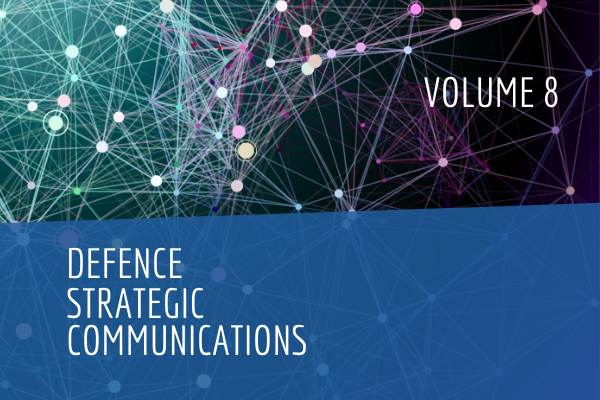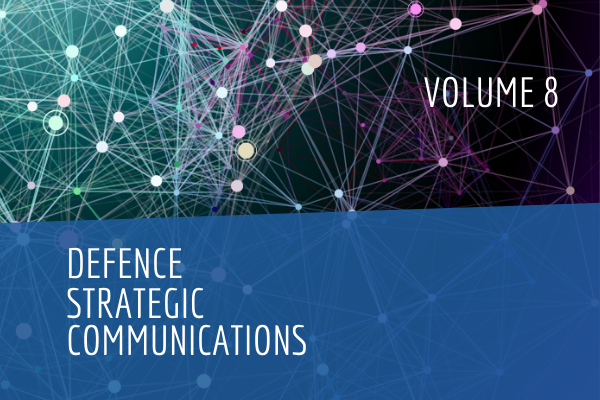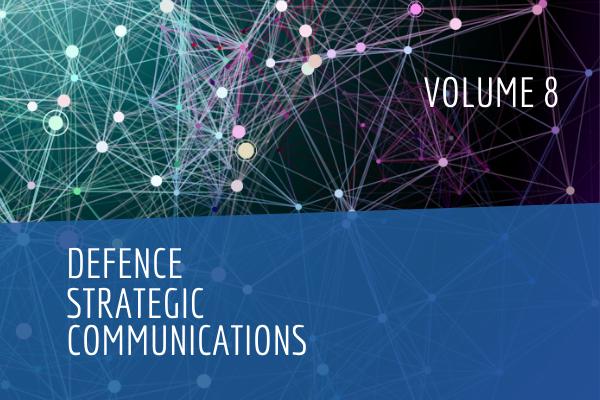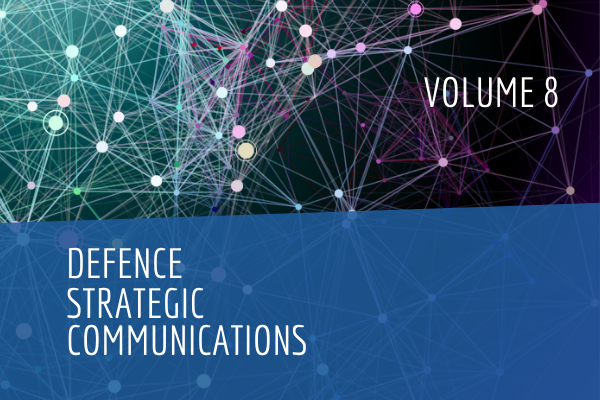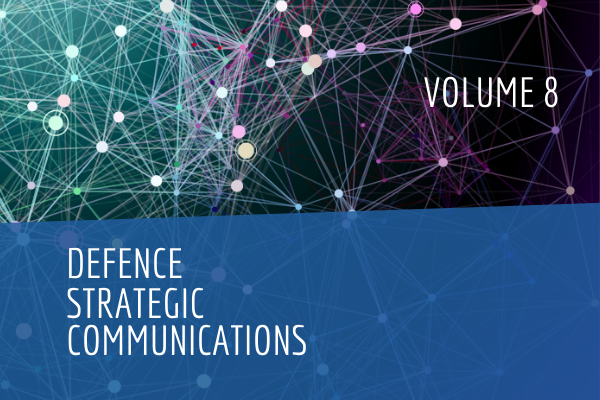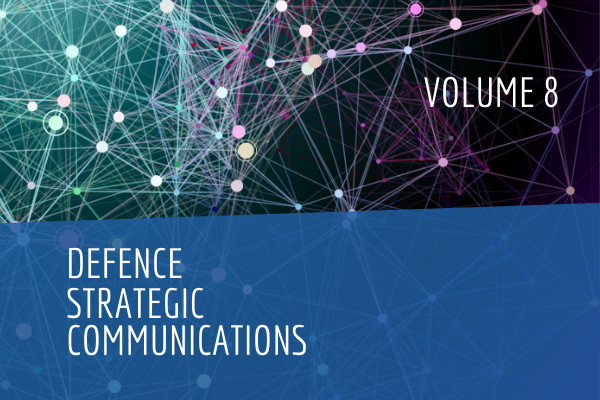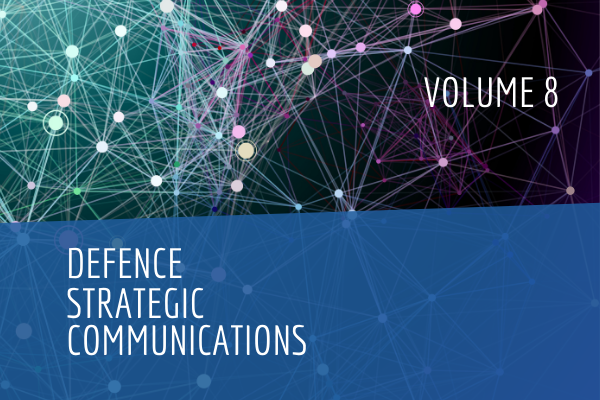Abstract
The term strategic communications is missing from the Israeli academic and professional discourse. Instead, there are three different conceptual approaches to state communication in Israel—hasbara, public diplomacy, and cognitive campaign. Analysing the history of the development and employment of these three concepts, this article makes two contributions important for the field of strategic communications. First, it analyses how Israel has found itself with various approaches; why it does not have one comprehensive framework; and whether any of the three approaches can be considered the equivalent of ‘Israeli strategic communications’. Second, based on the case of Israel, it establishes the need for states to have an exhaustive conceptual framework to conduct strategic communications and the consequences of the absence of such a framework.
Keywords—strategic communications, strategic communication, Israel, Hasbara, public diplomacy, cognitive campaign
About the Authors
David Siman-Tov is a Research Fellow at the Institute for National Security Studies (INSS) at Tel Aviv University, Israel. His recent publication is The Cognitive Campaign: Strategic and Intelligence Perspectives (INSS, 2019) coedited with Yossi Kuperwasser.
Dr Ofer Fridman is Director of Operations at the King’s Centre for Strategic Communications (KCSC) and a Lecturer at the Department of War Studies, King’s College London.
Bibliography:
‘About Strategic Communications’, NATO Strategic Communications Centre of Excellence, (accessed 25 January 2020).
Adamsky, Dima, The Culture of Military Innovation: The Impact of Cultural Factors on the Revolution in Military Affairs in Russia, the US and Israel (Stanford: Stanford University Press, 2010).
Alon, Nizan and Dana Preisler-Swery, ‘“Ritzat hamaraton ve’tki’yat maklot be’galgalei oyev” hama’arakhot she’bein milkhamot shel tza’l’ [“Running a Marathon and Sticking Sticks in the Enemy’s Wheels” The Campaigns between the Wars of the IDF], Bein Haktavim, Nº 22–23, 2019, p. 13–31.
Aspects of Preparedness of Hasbara Bodies and Their Functioning in the Second Lebanon War (Hebrew), (Jerusalem: State Comptroller of Israel, January 2007).
Ben Yishai, Ron, ‘Milkhemet hatoda’a shel dover tzal’ [The Cognitive War of the IDF Spokesperson], Ynet, 13 September 2019, (accessed 8 April 2020).
Ben-Meir, Dov, Mediniyut Hutz [Foreign Policy] (Tel-Aviv: Yedioth Ahronoth and Chemed Books, 2011).
Ben-Meir, Yehudah, Civil-Military Relations in Israel, (New York: Columbia University Press, 1995).
Benayahu, Avi, ‘Milkhemet ha’asbara be’idan hadigitali’ [The Hasbara War in the Digital Age], Ma’archot, Nº 445, 2012, p. 4–9.
Bolt, Neville and Leonie Haiden, Improving NATO Strategic Communications Terminology, (Riga, Latvia: NATO Strategic Communications Centre of Excellence, June 2019).
Bolt, Neville, ‘Foreword’, Defence Strategic Communications, Vol. 6, Spring 2019, pp. 3-8.
Cohen, Stuart, ‘Changing Civil—Military Relations in Israel: Towards an Over-subordinate IDF?’, Israel Affairs, Vol. 12, Nº 4, 2006, pp. 769-788.
Colonel D and Major J, ‘Toda’a be’am’ – irgunim meshutafim ezrahiim-tzvaiim’ [“Cognition Ltd.” – Joint Military-Civil Organizations], in Kuperwasser, Yossi
45 and David Siman-Tov, (eds), Hama’araha al hatoda’a: hebetim hastrategiim vemodeiniim [The Cognitive Campaign: Strategic and Intelligence Perspectives], (Tel-Aviv: INSS, IRMI, 2019).
Cull, Nicholas, ‘Public Diplomacy before Gullion’, in Snow, Nancy and Nicolas Cull (eds), Routledge Handbook of Public Diplomacy, (New York: Routledge, 2020).
Diplomatya Tziburit be’Israel [The Public Diplomacy of Israel], Samuel Neaman Institute, Technion University, The Ministry of Foreign Affairs of the State of Israel, 2009.
Dratwa, Sasha, at conference Pituakh ve’new media takhat esh [Development and New Media Under Fire], The Israeli Internet Association (ISOC-IL), 15 February 2013, (Video), (accessed 8 April 2020).
Dvori, Nir, ‘Dover tzal be’aravit mitgare be’haniya: “haya shave lirot le’ever Israel?’ [The IDF Arabic Language Spokesman Teases Ismail Haniyeh: “Was it Worth Shooting at Israel?], Channel 12 News, 26 March 2019, (accessed 8 April 2020).
Efraim Inbar, Israel eina mevudedet [Israel Is not Isolated] (Tel-Aviv: Begin-Sadat Centre for Strategic Studies, 2013).
Eiland, Giora, ‘The IDF in the Second Intifada’, Strategic Assessment, Vol. 13, Nº 3, 2010, p. 27–37.
Etzioni-Halevy, Eva, ‘Civil-Military Relations and Democracy: The Case of the Military-Political Elites’ Connection in Israel’, Armed Forces and Society, Vol. 22, 1996, p. 401–417.
Farwell, James, Persuasion and Power: The Art of Strategic Communication, (Washington, DC: Georgetown University Press, 2012).
Freedman, Lawrence, Ukraine and the Art of Strategy, (New York: Oxford University Press, 2019).
Fridman, Ofer, ‘“Information War” as the Russian Conceptualisation of Strategic Communications’, The RUSI Journal, Vol. 165, Nº 1, 2020, pp. 45-53.
Fridman, Ofer, ‘The Russian Perspective on Information Warfare: Conceptual Roots and Politicisation in Russian Academic, Political, and Public Discourse’,
Defence Strategic Communications, Vol. 2, Spring 2017, pp. 61–86.
Fridman, Ofer, Enemy Civilian Casualties: Politics, Culture and Technology, (Lanham: Lexington Books, 2019).
Gad, Yair and Sharona Odom-Weiss, ‘Israeli Diplomacy: The Effects of Cultural Trauma’, The Hague Journal of Diplomacy, Nº 9, 2014, p. 1–23.
Gad, Yair, ‘Israeli Existential Anxiety: Cultural Trauma and the Constitution of National Character’, Social Identities: Journal of the Study of Race, Nation and Culture, Vol. 20, No. 4–5, 2014, pp. 346-362.
Gad, Yair, Tzofen ha’isareliyut: aseret ha’dibrot shel’ shnot he’al’paiim [The Code of Israeliness: The Ten Commandments for the 21st century], (Jerusalem: Keter Books, 2011).
Gal, Shai, ‘Yehidat hatiud hamivtzai’ [The Combat Documentation Unit], Channel 2 News, 26 June 2015, (Video), (accessed: 8 April 2020).
Galili, Rave, ‘Ha’Ma’araha she’bein milkhamot ve’ha’ma’amatz ha’ne’elam’ [The Campaign between the Wars and the Invisible Effort], Bein Haktavim, Nº 22–23, 2019, p. 75–91.
Goodman, Giora, ‘“Palestine’s Best”: The Jewish Agency’s Press Relations, 1946–1947’, Israel Studies, Vol. 16, Nº 3, 2011, pp.1-27.
‘Ha’ium hakharig shel dover tzal be’aravit—al sar hatayarut shel levanon’ [The Unusual Threat by the IDF Arabic Language Spokesman against Lebanon’s Minister of Tourism], Channel 12 News, 28 August 2019, (accessed 8 April 2020).
Harel, Amos, ‘“Mahleket toda’a”: tzal hikim guf she’ifa’al mul medinot zarot le’hashpa’a al de’at haka’al’ [“Department of Cognition”: The IDF Established a Unit that will Act against Foreign States to Influence Public Opinion], Haaretz, 4 December 2018, (accessed: 8 April 2020).
IDF Strategy (Hebrew), Office of the Chief of Staff of the Israel Defence Forces, April 2018, (accessed 8 April 2020).
Israeli Hasbara: Myths and Facts: A Report on the Israeli Hasbara Apparatus 2012 (Jerusalem: Molad-The Center for the renewal of Israeli Democracy, 2012).
47 Joint Doctrine Note 2/19. Defence Strategic Communication: an Approach to Formulating and Executing Strategy, (London: Ministry of Defence, 2019).
Klieman, Aaron, Israel & the World after 40 Years, (McLean, VA: Pergamon- Brassey’s International Defense Publishers, 1990).
Kober, Avi, ‘The Rise and Fall of Israeli Operational Art, 1948–2008,’ in Olsen, John and Martin Creveld Van (eds), The Evolution of Operational Art: From Napoleon to the Present (Oxford: Oxford University Press, 2010).
Kober, Avi, ‘What Happened to Israeli Military Thought?’, Journal of Strategic Studies, Vol. 34, Nº 5, 2011, p. 707–732.
Kohen, Gili and Amos Harel, ‘Dover Tzal Haba: Ozro ak Ha’ramatkal Izenkot, Aluf Mishne Ronen Manelis’ [The Next IDF Spokesperson: The Assistant of the Chief of General Staff Eizenkot, Col. Ronen Manelis], Ha’aretz, 07 February 2017, (assessed 9 April 2020).
Kuperwasser, Yossi and David Siman-Tov, ‘Preface’, in Kuperwasser, Yossi and David Siman-Tov, (eds), The Cognitive Campaign: Strategic and Intelligence Perspectives, (Tel-Aviv: Institute for National Security Studies (INSS), The Institute for the Research of the Methodology of Intelligence (IRMI), 2019).
Lapid, Ephrayim, ‘Dover tzal modiya: mi’mlhemet atzmaut ve’ad edan hatwitter’ [IDF Spokesperson Announces: From the War of Independence to the Age of Twitter], IsraelDefense, 17 September 2019 (accessed 7 April 2020).
Lapid, Yair, quoted in ‘Lapid: yesh lanu koah, mamash lo zkukim le’Olmert’ [Lapid: We have the power, there is no need for Olmert], Makor Rishon, 18 July 2012, (accessed 8 April 2020).
Livni, Tzipi, quoted in Public Diplomacy in a World of Rapid Change—Assessing the Political-Security Situation, (Hebrew), Internal Document of the Ministry of Foreign Affairs of the State of Israel, 2008, (Classified).
Magen, Clila and Ephraim Lapid, ‘Israel’s Military Public Diplomacy Evolution: Historical and Conceptual Dimensions’, Public Relations Review, Issue 44, 2018, p. 287–98.
Manelis, Ronen, in ‘Conversation between Noam Manella and IDF Spokesman Brigadier General Ronen Manelis’, INSS, 29 January 2019, (Video),(accessed 8
April 2020).
Manor, Jonatan, ‘Kishalon ha’asbara or kishalon ha’mediniyut?’ [A Failure of the Hasbara or a Failure of the Policy?], in Gronik, Benjamin and Arie Noiberger (eds), Mediniut Hutz Bein imut le’esderim—Israel 1948–2008 [The Foreign Policy between Conflict and Agreement—Israel 1948-2008], Vol. B, (Ra’anana: The Open University of Israel, 2008).
Melamed, Yosi and Dan Raviv, Milhamot ha’tzlalim, hamosad ikehilat hamodi’in [The Shadow Wars, the Mossad, and the Intelligence Community], (Tel-Aviv: Yadiot Hasfarim, 2012).
Menalis, Ronen, ‘Ma’apekha hadigitalit shel tzal’, [The Digital Revolution of the IDF], at conference Dgit- Kenes itonut digitalit [Digi—Conference of Digital Journalism], Interdisciplinary Centre Herzliya (IDC), 9 April 2018, (Video), (accessed 8 April 2020).
Moshe, Yegar, ‘He’arot al sherut ha-huts shel israel’ [Remarks on the Foreign Service of Israel], Opinion Paper Nº 160, (Sha’arei Tikva: The Ariel Centre for Policy Research (ACPR), 2005).
Nir, Shmuel, ‘Teva ha’imut hamugbal’ [The Nature of Limited Conflict], in Shai, Shaul and Hagai Golan, (eds), Haimut hamugbal [The Limited Conflict], (Tel- Aviv: Ma’arachot, 2004).
Paul, Christopher, Strategic Communication, (Santa Barbara, CA: Praeger, 2011).
Pedro, Sharon, Utzma raka ke’nehes leumi [Soft Power as a National Asset], (Jerusalem: The Jewish People Policy Planning Institute, 2004).
Peri, Yoram, Milkhamot munkhot tekshoret: paradox ha’utzma vehadilema ha’astrategit shel tzal [Mediatized Wars: The Power Paradox and the IDF’s Strategic Dilemma], (Tel-Aviv: INSS, 2017).
Phillips, Melaie in an interview on ‘Roim Ulam’ [See the World], Channel 1, 10 January 2011, (Video), (accessed: 8 April 2020).
Prosor, Ron, ‘Hadiplomatiya haisraelit be’ulam meshtane: mimegnana le’yozma’ [Israeli Diplomacy in the Changing World: From Defence to Initiative], at Herzliya Conference, 22 January 2006, (accessed 8 April 2020).
49 Public Diplomacy in a World of Rapid Change—Assessing the Political-Security Situation, (Hebrew), Internal Document of the Ministry of Foreign Affairs of the State of Israel, 2008, (Classified).
Rabin, Yitzhak, Speech in the Knesset Regarding the U.N. General Assembly Resolution from 10 November 1975 about Zionism, 11 November 1975 (Hebrew), published in Telem, Inbal, Shmuel Tzvaog, and Benjamin Noiberger (eds), Mediniyut ha’hutz shel Israel—kovetz mismachim [The Foreign Policy of Israel—Documents Collection], Vol. A., (Ra’anana: The Open University of Israel, 2004).
Raveh, Saar, ‘Sipur hakamat ha’malat’ [The Story of the Establishment of the Centre for Consciousness Operations], (Ramat Hasharon: The Meir Amit Intelligence and Terrorism Information Centre (ITIC), March 2019).
Resolution 3379: Elimination of All Forms of Racial Discrimination, UN General Assembly, New York, 10 November 1975.
Riemer, Ofek and Daniel Sobelman, ‘Coercive Disclosure: Israel’s Weaponization of Intelligence’, War on the Rocks, 30 August 2019, (accessed: 8 April 2020).
Rosenblatt, Gary, ‘“Hasbara” Goes Prime Time’, The Jewish Week, 12 March 2003, (accessed 26 January 2020).
Schleifer, Ron, ‘Jewish and Contemporary Origins of Israeli Hasbara’, Jewish Political Studies Review, Vol. 15, 2003, pp. 123-153.
Shabtai, Shay, ‘T’fisat ha’ma’arakha she’bein hamilkhamot’ [The Concept of the War Between Wars], Ma’arachot, Nº 445, 2012, p. 24–27.
Shachar, Amihud, ‘Ha’baya eina be’tzal’ [The Problem is not in the IDF], Ma’arachot, Nº 380–381, 2001, p. 88–89.
Shai, Nachman, Milkhamedia [Media War], (Tel Aviv: Yediot Ahronot, 2013).
Shalev, Tal, ‘Da’aga be’yerushalaim: hanotzrim ha’evangelistiim be’hartzot habrit mitrakhekim ni’israel’ [Jerusalem is Worried: Evangelical Christians Distance Themselves from Israel], WallaNews, 7 August 2016, (accessed 8 April 2020).
Siboni, Gabi and Gal Perl Finkel, ‘The IDF’s Cognitive Effort: Supplementing the Kinetic Effort’, INSS Insight, Nº 1028, 1 March 2018.
Siman-Tov, David and David Sternberg, ‘The Missing Effort—Integrating the “Non-lethal” Dimension in the Israeli Military Lines of Operation’, Cyber, Intelligence and Security, Vol. 1, Issue 3, 2017, p. 65–81.
Siman-Tov, David and Shay Hershkovitz, Aman yotze le’or, [Military Intelligence Comes to the Light], (Tel-Aviv: Ma’arachot, 2013).
Sofer, Sasson, ‘Towards Distant Frontiers: The Course of Israeli Diplomacy’, Israel Affairs, Vol. 10, Nº 1–2, 2004, pp. 1-9.
Tal-Saranga, Israel, ‘Diplomatiya Tziburit Tzvait’ [Military Public Diplomacy], Ma’arachot, Nº 446, 2012, p. 11–19.
The Division of Public Policy at the Ministry of Foreign Affairs of the State of Israel, (Hebrew), (accessed 8 April 2020).
The Full Report of the Commission of Inquiry into the Events of Military Engagement in Lebanon 2006 (Hebrew),The State of Israel, January 2008.
The Ministry of Strategic Affairs and Public Diplomacy, Prime Minister’s Office, (accessed 8 April 2020).
The State of Israel, Law Memorandum: Freedom of Information Law (Amendment No. 16) (Exception of the Ministry of Strategic Affairs and Hasbara in regards to its activities within the responsibility given to it by the Government to lead the campaign against the delegitimisation and boycotting of Israel), 2017, reference: 803-99-2017-025616.
The State of Israel, The Full Report of the Commission of Inquiry into the Events of Military Engagement in Lebanon 2006 (Hebrew), January 2008.
United States Government Compendium of Interagency and Associated Terms, (Washington DC, November 2019).
Vaknin-Gil, Sima, ‘Etgarim lebitakhon leumi’ [Challenges to National Security], at conference Bitakhon leumi, faik news ve’hakrav al hatoda’a be’idan hadigitali [National Security, Fake News, and the Battle for Perception in the Digital Age], Institute for National Security Studies (INSS), 11 November 2019, (Video), (accessed 8 April 2020).
Vaknin-Gil, Sima, ‘Hakrav al hatoda’a vemilkhamot ha’atid’ [The Battle for Perception and Future Wars], at conference Kenes Meir Dagan lebitakhon
51 ve’astrategiya [The Meir Dagan Security and Strategy Conference], Netanya Academic College, 21 March 2017, (Video), (accessed 8 April 2020).
Vatikai, Yarden and Colonel O, ‘When the Intelligence Officer and the Public Diplomat Meet’, in Kuperwasser, Yossi and David Siman-Tov, (eds), The Cognitive Campaign: Strategic and Intelligence Perspectives, (Tel-Aviv: INSS, IRMI, 2019).
Vatikai, Yarden, ‘The State’s Strategic Effort’, at the conference The Cognitive Campaign: Gaza as a Case Study, INSS, 25 June 2018, (Video), (accessed 8 April 2020).
Vatikai, Yarden, ‘Tifkud hadiplomatiya hatziburit ha’israelit’ [The Performance of Israel’s Public Diplomacy], at the conference Tikshoret beinleumit bmivtza tzik eitan [International Communications during the Operation Protective Edge], Bal-Ilan University, 23 November 2014, (Video), (accessed 8 April 2020).
Waxman, Haim and Daniel Cohen, ‘Beyond the Web: Diplomacy, Cognition, and Influence’, in Kuperwasser, Yossi and David Siman-Tov, (eds), The Cognitive Campaign: Strategic and Intelligence Perspectives, (Tel-Aviv: INSS, IRMI, 2019).
Ya’alon, Moshe, ‘Ptah Davar’ [Foreword], in Elran, Meir, Gabi Siboni and Kobi Michael, (eds), ‘Astrategiyat Tzal’ b’rei habitahon haleumi [‘The IDF Strategy’ in the Perspective of National Security], (Tel Aviv: INSS, 2016), p. 7.
Ya’alon, Moshe, ‘The Cognitive War as an Element of National Security: Based on Personal Experience’, in Kuperwasser, Yossi and David Siman-Tov, (eds), The Cognitive Campaign: Strategic and Intelligence Perspectives, (Tel-Aviv: INSS, The Institute for the Research of the Methodology of Intelligence (IRMI), 2019).
